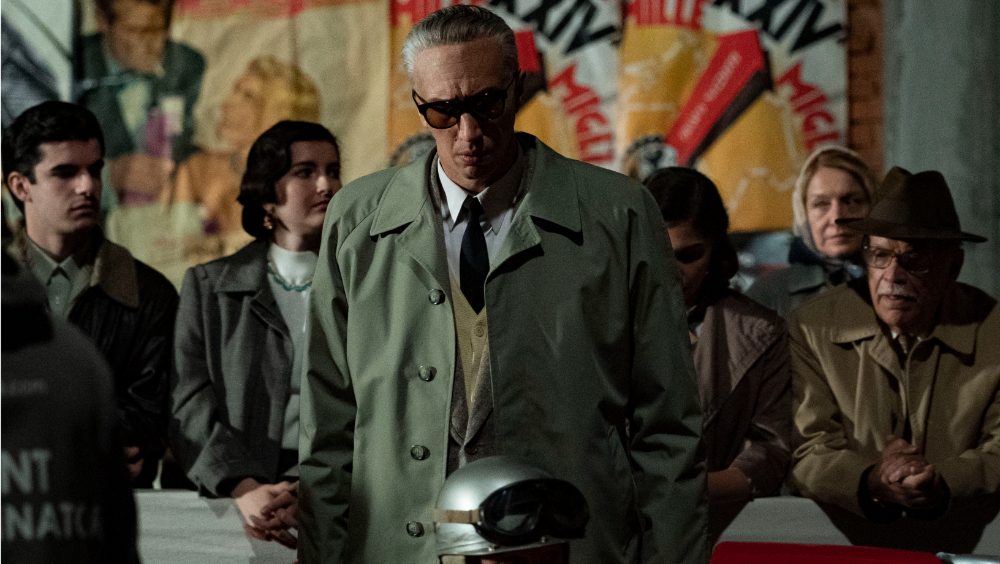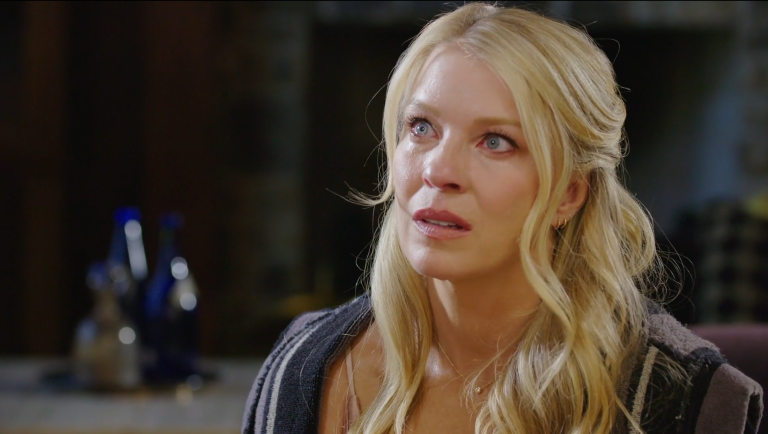When prestige indie label Neon paid a reported $90 million for Michael Mann’s “passion project” about arguably history’s greatest racing-car manufacturer, one could have been forgiven for wondering whether the faded “Heat” director had returned to form with an atypically cerebral sports drama. It turns out “Ferrari” has all the quality of a script that’s been kicked around for years before getting foisted on a hapless filmmaker who owed someone a favor.
Two decades into running his own company, Enzo Ferrari (Adam Driver) is on the brink of collapse. We first meet him skulking out of the home he shares with his mistress Lina (Shailene Woodley) and their son, the undignified beginning to a week the film’s characters frequently remind us is cursed: twenty-four years ago, two of the driver-turned-tycoon’s closest friends died while pursuing the thrill of their shared “terrible joy.” As a major competition, the Mille Miglia approaches, Enzo battles an Italian press corps that has vilified him as a “widowmaker” and seeks an influx of foreign capital from Henry Ford II without relinquishing any executive power. Complicating matters are the controlling shares he signed over during the war to his wife Laura (Penélope Cruz) to hide company assets from the Nazis.
Broken by the loss of their child and ongoing infidelity, the couple is held together only by a mutual knack for business. Again and again, Laura proves to be the beleaguered CEO’s fiercest adversary. Her demand for a payout in exchange for the signed documents that will grant Enzo unilateral bargaining power in his meeting with Ford leads to a discovery that sends his personal life crashing into the company’s best interests. There is never any doubt regarding his priorities, though.
In an early scene, Enzo presides over a practice run while a stranger heckles him for the chance to get behind the wheel of a Ferrari. “I have enough drivers,” he tells him moments before that stops being the case. While bystanders rush to the crash site, an unfazed Enzo turns to the young man and gives him the job. In other words, viewers who are wondering by the time Laura delivers her final ultimatum whether this corporate magnate will put family first have not been paying attention.

If there is anything noteworthy about “Ferrari,” it’s Mann’s decision to focus on his subject’s failures rather than triumphs. Because of the topic, Ron Howard’s “Rush” and James Mangold’s “Ford v Ferrari” are likely to be on audience members’ minds, but strangely enough, I kept thinking about “Moneyball.” Like Billy Beane, Enzo is in part motivated to revolutionize the sport by his own shortcomings as a young athlete. Driver’s acting in a phone call scene during which he’s reluctant to acknowledge a fatal accident resembles Ryan Gosling’s stolid depiction of Neil Armstrong in “First Man.” His performance is the movie’s only consistently watchable element.
Cruz serviceably plays the archetype of an emotionally unstable spouse to a great man who knows better than anyone else how to cut him down to size. Based on the performance’s reception, she’ll probably be in the mix for a Best Supporting Actress nomination alongside Emily Blunt, who fulfills an essentially identical function in “Oppenheimer.” Shailene Woodley is a fine actress, as this year’s underrated “To Catch a Killer” reminded us, but she’s gratingly bad here. To be fair, though, even a higher-caliber performer using a more credible Italian accent would have trouble selling the shoddy dialogue with which she (and pretty much everyone else in this misbegotten dumpster fire) is burdened.
The film is no better visually. Mann’s persistent use of a high shutter speed, instead of creating what one can only assume the director thought would be a gritty aesthetic, makes the whole thing look like an overexposed Dior ad. An instance of ghoulish CGI renders a tragic scene unintentionally campy. Artless editing and handheld camerawork, as well as sequences that, frankly, look strung together with stock footage, further impoverish the movie’s presentation. It’s astonishing that this was shot by Oscar winner Erik Messerschmidt, whose skill as a DP we can only keep our fingers crossed will be more abundantly displayed in David Fincher’s upcoming “The Killer.”
Because of the racing scenes and Driver’s physical transformation, don’t count “Ferrari” out for sound and makeup nominations. As mentioned earlier, the buzz is also circling Cruz, an Oscar favorite who just two years ago wrangled an unlikely bid for “Parallel Mothers.” Otherwise, it’s difficult to picture voters taking this movie seriously. Enzo Ferrari may have been a passionate, complex visionary. “Ferrari,” on the other hand, is a drab and uninspired slog.

![Licorice Pizza [2021] Review: Alana Haim & Cooper Hoffman shine bright in Paul Thomas Anderson’s love letter to coming of age cinema](https://79468c92.delivery.rocketcdn.me/wp-content/uploads/2021/12/Licorice-Pizza-2021-768x384.jpg)




